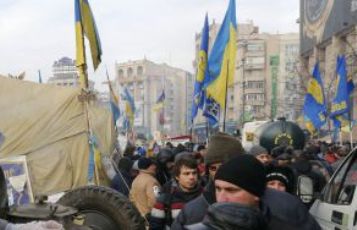The United States and the European Union have imposed new sanctions on Russia that target individuals and companies linked to Russian President Vladimir Putin’s inner circle. The moves come as the crisis in eastern Ukraine faces continued chaos. On Monday, pro-Russian separatists seized a new town and continued to detain seven European monitors. The mayor of the Ukraine’s second-largest city, Kharkiv, was shot in the back and is now in critical condition. Ukraine’s government and Western powers have accused Russia of orchestrating the unrest as a pretext for an invasion. We host a roundtable discussion with three guests: Christopher Miller, an editor at Kyiv Post, who has been based in Ukraine for four years; Jack Matlock, the U.S. ambassador to the Soviet Union from 1987 to 1991; and Nina Khrushcheva, a professor of international affairs at The New School, and author of forthcoming book, “The Lost Khrushchev: Journey into the Gulag of the Russian Mind.”
Transcript
This is a rush transcript. Copy may not be in its final form.
AARON MATÉ: The U.S. and European Union have imposed new sanctions on Russia amidst heightened tensions in eastern Ukraine. The U.S. sanctions target seven Russian government officials and 17 companies linked to Russian President Vladimir Putin’s inner circle. State Department spokesperson Jen Psaki told reporters the U.S. still has a, quote, “tool box of steps” it can take against Russia.
JEN PSAKI: Obviously, this morning we’ve been making clear—the United States has been making clear that it would impose additional costs if Russia—on Russia, if it failed to live up to its Geneva commitments and failed to take concrete steps to de-escalate the situation in Ukraine. Consequently, today, this morning, the United States is imposing targeted sanctions on a number of Russian individuals and entities, and restricting licenses for certain U.S. exports to Russia. Can Russia still de-escalate and take steps? Absolutely they can. Do we still have a tool box of steps we can take? Absolutely, we do. And we’re working in close consult—in close lockstep with the Europeans on this, as well.
AARON MATÉ: One day after the U.S., the European Union followed suit today with new sanctions on 15 more people suspected of having a direct link to the Ukrainian unrest. These moves come as the crisis in eastern Ukraine faces continued chaos. On Monday, pro-Russian separatists seized a new town and continued to detain seven European monitors.
Meanwhile, the mayor of Ukraine’s second-largest city is in critical condition after an attempt on his life. Kharkiv Mayor Hennadiy Kernes was shot in the back on the outskirts of the city, just 20 miles from the border with Russia. It’s unclear who was behind the attack. This is a surgeon who treated Kernes, followed by Kharkiv’s deputy mayor.
DR. VALERIY BOYKO: [translated] He is stable at the moment, but his condition is still severe, even closer to very severe, as it usually is with these types of injuries. When it comes to these types of injuries, the bleeding is usually rather strong. We’re talking about up to one-and-a-half liters of blood in total.
DEPUTY MAYOR MIKHAILO DOBKIN: [translated] If somebody thinks that this is the way to dramatically improve the situation, he is wrong. Any aggression will only increase confrontation.
AMY GOODMAN: The armed separatists in eastern Ukraine are seeking independence or annexation with Russia. Ukraine’s government and Western powers have accused Russia of orchestrating the unrest as a pretext for an invasion. All this comes as the Pentagon says Russia’s defense chief assured U.S. Defense Secretary Chuck Hagel in a telephone call Monday that Russia would not invade Ukraine. Meanwhile, the country continues to prepare for its May 25th presidential election.
Read the full transcript in Democracy Now!










